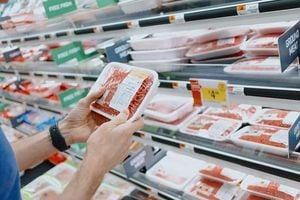McDonald's is facing significant fallout from its latest E. coli outbreak linked to its Quarter Pounder hamburgers, with lawsuits already being filed and customers turning away from the fast-food giant. The outbreak, which has sickened at least 90 individuals, sparked immediate concern among the public and has had noticeable impacts on customer foot traffic at restaurants across the country.
Recent data reveals alarming trends. According to analytics from Placer.ai, McDonald's locations saw a steep decline in customer visits, particularly following the announcement of the outbreak on October 22. Customer traffic dropped by 6.31% compared to the same period last year. This dip was especially pronounced in Colorado, where some restaurants reportedly experienced up to 32.6% fewer customers.
The dip continues as reports of E. coli linked to tainted onions supplied by Taylor Farms continue to surface. “Our data indicated significant declines, with year-over-year visits down by 9.4% on October 25, just days after the news broke,” said R.J. Hottovy, head of analytic research at Placer.ai. Despite these troubling numbers, McDonald's had observed positive trends earlier this year owing to successful promotional strategies, including the popular $5 Meal Deal.
Among those affected by the outbreak is Susan M., who filed suit against McDonald's after experiencing severe health issues linked to the consumption of the Quarter Pounder. Susan noted, "I had never imagined my meal could make me this sick. It's just shocking to see such major health risks when dining at what is supposed to be a trusted place." Her case is just one among several lawsuits as individuals seek accountability for the health risks associated with what was once deemed familiar and safe fast food.
The concern isn’t just limited to health and safety. McDonald’s stock may also take a hit due to the public perception surrounding its food safety protocols. Investors are watching closely as the company reels from both negative press and potential legal consequences. This outbreak is occurring at a time when much of the food industry is still recovering from previous supply chain issues and the economic troubles stemming from the pandemic.
Even though McDonald's has said their beef is not the source of the E. coli, the spotlight now turns onto their suppliers, with health officials signaling they are focusing on the onions provided by Taylor Farms. The CDC has initiated multiple consumer interviews to trace the outbreak back to its source, highlighting commonalities among those who got sick.
On a brighter note, McDonald’s has reiterated their commitment to food safety. They are actively reviewing their supply chain protocols to prevent such outbreaks from occurring again. “We take these incidents seriously and are doing everything we can to address the issue at hand,” stated McDonald’s spokesperson Jane Doe. “Our customers' health and safety is our priority.
The outbreak has crippled initial recovery efforts, leading some locations to implement additional safety measures, such as enhanced food handling training and stricter supplier vetting processes.
Affected customers are encouraged to report their experiences to health department authorities and are considering joining class-action lawsuits to seek compensation for the ordeals they’ve endured. Advocates for food safety are expressing concern over the need for swift regulatory action to enforce stricter health standards within fast-food establishments, which can often serve as ground zero for foodborne illnesses.
Despite the backlash and the immediate plummet of customers, some analysts predict McDonald’s may still weather the storm. The chain’s historical resilience and adaptability to health crises gives cause for some optimism among industry experts. “Fast food has always recovered from illness outbreaks by enhancing their food safety protocols and restoring consumer trust,” noted food industry analyst Tanya Green. “They will likely do so again, and it may take some time, but they will bounce back.”
For now, though, the E. coli outbreak remains fresh on everyone’s minds, and the fallout is very evident. With lawsuits pending and customer numbers falling, McDonald’s is faced with the challenge of rebuilding its reputation and maintaining the trust of its customers.
More than just headlines, the human stories behind these lawsuits shed light on the real consequences of foodborne illness. Customers like Susan M. are left grappling with the repercussions even as McDonald's vows to make changes. The entire fast-food community is left contemplating how incidents like this can be curtailed to improve food safety standards moving forward.



